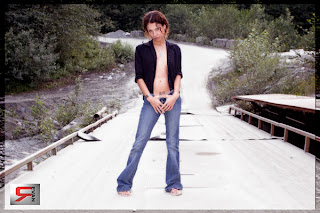
It’s rare to find a forest now that doesn’t reside in the shadow of high rises. So it’s understandable, what with our encroachment on their habitat and food sources, that bears and other wildlife find our garbage scrumptious— you would too if you had nothing else to eat.
It’s actually amazing that such huge animals manage to stay hidden from sight most of the time—but when they do come out, how does a regular citizen make a decision that is in the best interest of the animals and the community?
Conservation officers remind us to “stay calm, never turn and run, face the animal and make it aware of your presence” when you come into contact with black bears, the most common bear in the Lower Mainland. But after you’ve survived a run-in, the choice between animal and surrounding humans can be tough. Calling a conservation officer may be a call to certain death for a bear, but it may save your next door human neighbour. Not only that, but an armed person may take things into his own hands.
Our local bears are getting ready to hunker down for their annual hibernation, so that means they have to stock up on food and fat—that means your discarded leftovers. Why can’t the bears get their own damn food? Well, because humans have destroyed their homes and tempted them with easy meals.
It’s an increasingly prevalent problem in the suburbs—and even in busier cities—so how does a citizen make the right choice when the answer is so complicated? Some of the bearsafe requests made by BC’s Ministry of Environment seem contrary to our current green thought processes— what is good for some creatures is bad for others. Conservation officers frown on outdoor composting and encourage homeowners to chop down any unattended fruit trees to make backyards less appealing.
Like most problems, prevention is the best course of action. An easy step in saving the furrier members of our towns is in the way we deal with garbage: Keep it in your garage or in bear-proof containers, and wait until the day of collection to put it out. Don’t let lazy people continue to kill bears—it’s easier to kill then relocate.
It’s actually amazing that such huge animals manage to stay hidden from sight most of the time—but when they do come out, how does a regular citizen make a decision that is in the best interest of the animals and the community?
Conservation officers remind us to “stay calm, never turn and run, face the animal and make it aware of your presence” when you come into contact with black bears, the most common bear in the Lower Mainland. But after you’ve survived a run-in, the choice between animal and surrounding humans can be tough. Calling a conservation officer may be a call to certain death for a bear, but it may save your next door human neighbour. Not only that, but an armed person may take things into his own hands.
Our local bears are getting ready to hunker down for their annual hibernation, so that means they have to stock up on food and fat—that means your discarded leftovers. Why can’t the bears get their own damn food? Well, because humans have destroyed their homes and tempted them with easy meals.
It’s an increasingly prevalent problem in the suburbs—and even in busier cities—so how does a citizen make the right choice when the answer is so complicated? Some of the bearsafe requests made by BC’s Ministry of Environment seem contrary to our current green thought processes— what is good for some creatures is bad for others. Conservation officers frown on outdoor composting and encourage homeowners to chop down any unattended fruit trees to make backyards less appealing.
Like most problems, prevention is the best course of action. An easy step in saving the furrier members of our towns is in the way we deal with garbage: Keep it in your garage or in bear-proof containers, and wait until the day of collection to put it out. Don’t let lazy people continue to kill bears—it’s easier to kill then relocate.


No comments:
Post a Comment